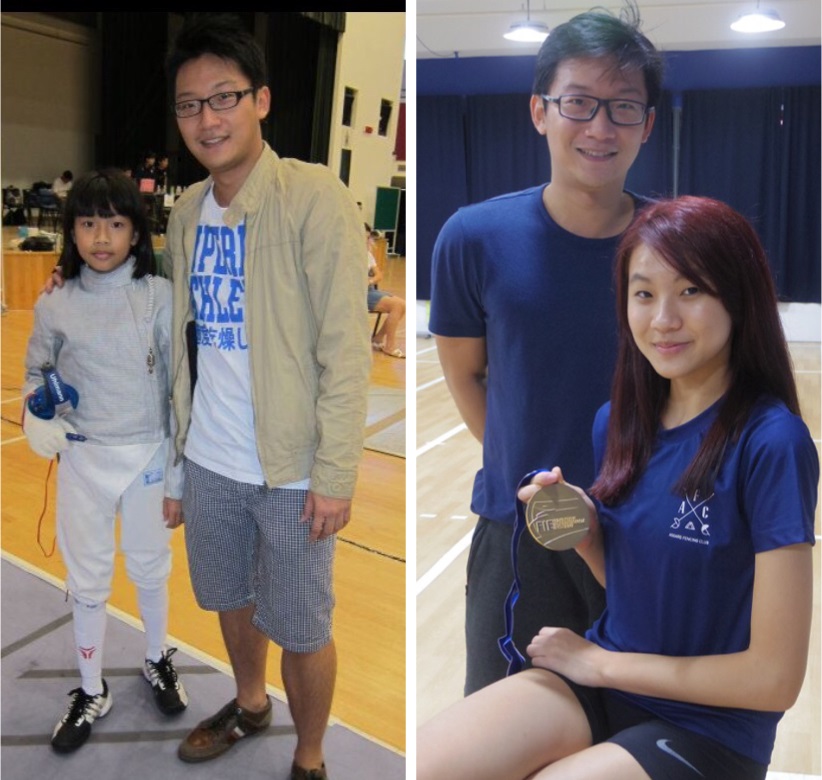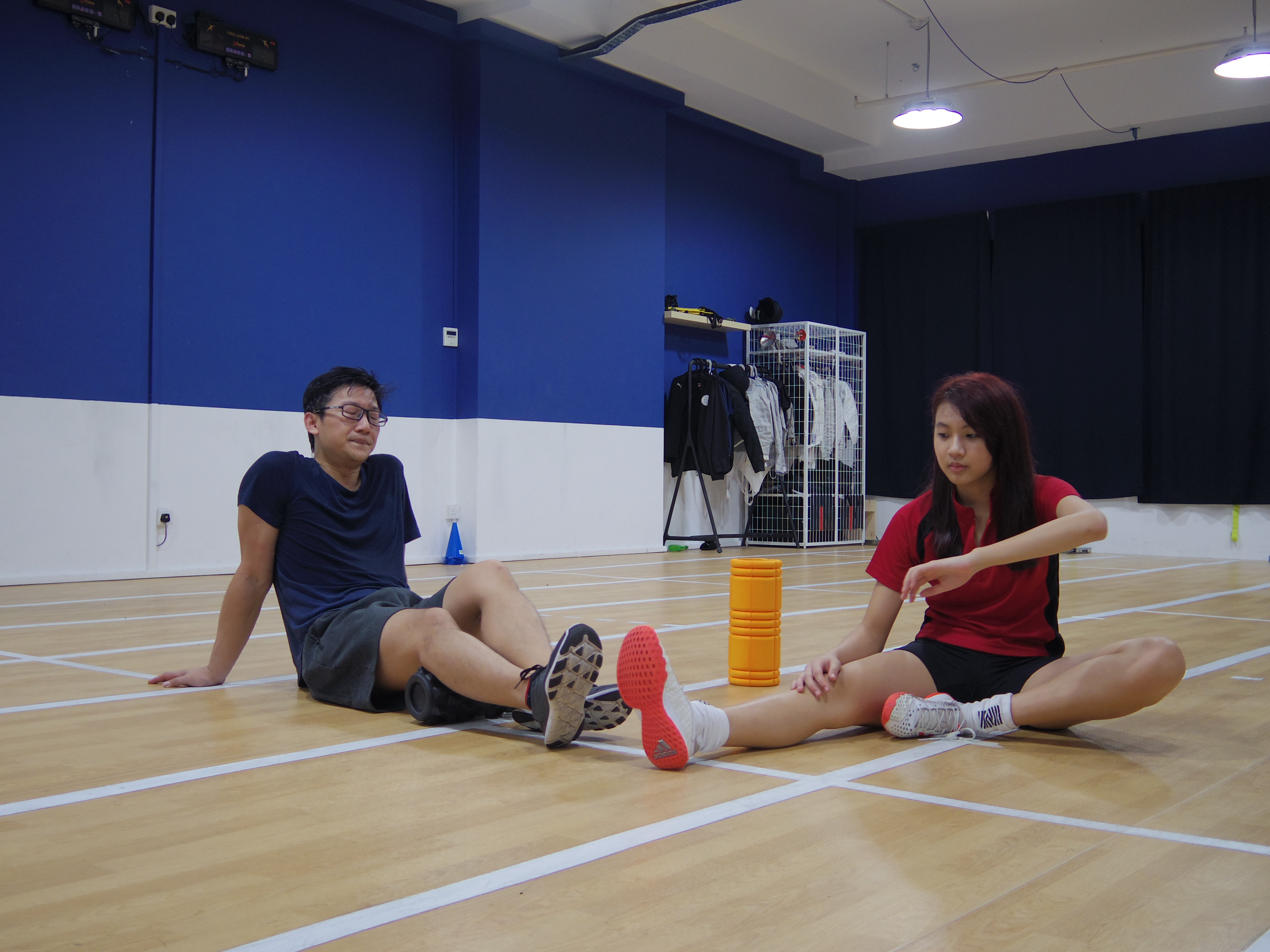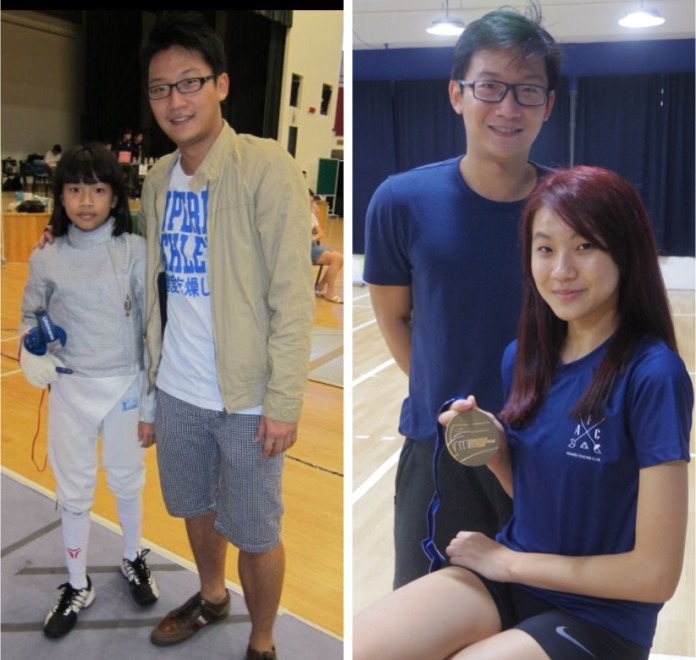SINGAPORE: The victory was so unexpected that organisers of the 2016 Fencing Cadet and Junior World Championships in Bourges, France, scrambled to find Majulah Singapura in their collection of national anthems.
Even Lau Ywen herself seemed in a state of disbelief after scoring the winning point that clinched her the cadet girls’ sabre world title, turning around to her coach David Chan and mouthing the words “Oh my God!”
But there was nothing unbelievable about the 16-year-old’s victory.
It was the result of careful planning, a systematic training regime and unstinting parental support – all coming together to nurture a precocious talent into a world-beater.
And this may be only the beginning.
In a year when Joseph Schooling broke through for Singapore’s first gold medal at the Olympics, Ywen also made history for her sport at the world championships, becoming the first Southeast Asian to win a fencing world title.
On the strength of this achievement, the smart bet is on fencing to be the next sport to score for Singapore at the Olympics.
German Ralf Bissdorf, who coached in Singapore from 2010 till mid this year, once said that the nation’s young fencers need to start producing results at international youth competitions if Singapore aspires to win an Olympic medal in fencing.
The sport features three distinct weapons – epee, foil and sabre – and the path to Olympic glory is well-trodden. Whatever age the athlete picks up one of the three swords, those with Olympic aspirations will start with competing in age-group competitions, then at Cadet (Under-17) and Junior (Under-20) levels, before graduating to the Senior (or Open) category.
Doing well at these milestones is imperative, and shows whether an athlete’s development is on track.
And Bissdorf, who was the 2000 Sydney Olympics men’s foil silver medallist, thinks Singapore’s fencing future is bright, as he pointed to an unprecedented 10 Singaporeans in the world top 100 in the latest world junior rankings.
Apart from Ywen, who’s 22nd in women’s sabre, men’s sabre has Fong Zheng Jie (41) and Daniel See (49). Foil has Amita Berthier (23) and Nicole Wong (40) in the women’s category, and Kevin Chan (22), Yeo Jing Zhe (45) and Jet Ng (77) in the men’s. Epee is represented by Kiria Tikanah Abdul Rahman (33) and Esther Lai (65).
At the moment, Ywen remains the only teenaged Singaporean athlete in any sport to have hit a significant enough milestone to be regarded as genuine Olympic potential. But the story could have turned out differently had she not been persuaded to switch over from foil, the weapon she started with at the age of six.
A NATURAL
For Ywen, what began as a diversion from the foil would soon become an obsession.
“At first it was just fun to try out, but once I tried out I loved it,” she said. “It’s really fast-paced, and has a different kind of movement to the other weapon groups.”
For coach David Chan, Ywen’s natural attacking style made the switch to sabre a no-brainer.
“In foil, it doesn’t hurt you to also be defensive… but for Ywen, she was very purely aggressive all the time. So when I saw that kind of behaviour, I thought she should be in sabre instead,” said the 30-year-old, who also pointed out his charge was no slouch with the foil.
“She made the switch the day after she won the Under-12 national championship, so you could say she retired on top.”
Since the switch in September 2011, Ywen’s progress has been rapid. By 2013, she had won several competitions, including the Singapore Under-14 title. The next year saw her becoming the first Singapore to crack the top eight at the Asian Fencing Championship, winning the cadet championship at national and Southeast Asian level. She also went to the Asian Games in Incheon, reaching the final 16 as the competition’s youngest fencer.
Her SEA Games debut at home last year yielded bronze medals in individual and team events, but the biggest result would be the world championships this April, with a 15-14 win over German junior champion Larissa Eifler for the cadet world crown.
Former Singapore sabre head coach, Andras Decsi, is not surprised by Ywen’s rapid rise.
“Her competitions and career has been planned systematically, and based on her skills and improvement, the goal was always to first become world champion in the cadet age group,” said 39-year-old Decsi, who continues to play an active role in guiding the teenager’s progress.
Success is a topic Decsi knows well. Last September, he chose to return to his native Hungary following a request from 2012 London Olympics men’s individual sabre gold medallist Aron Szilagyi to train under him. Szilagyi would go on to successfully defend his gold medal in Rio 2016.
Recalling his first meeting with Ywen when she was 12, Decsi said: “She was very enthusiastic from the very beginning, and there was no fear in her eyes.”
That, too, was Chan’s observation as he explained further what stood his star pupil out from the rest.

Ywen has known her coach David Chan for half her lifetime as they share the journey to the world title. (Photo: Cynthia Lau)
“Apart from being naturally fast and well-coordinated, Ywen has this ability to make necessary changes during the chaos of a bout,” he said.
“Many fencers do not have the ability or take many years to develop that type of maturity. Some might never ever get it because it’s all about composure, and being able to analyse things under a lot of pressure, in a very short span of time, immediately, and especially in a sabre match where it’s so intense and so short.
“A lot of fencers know when a particular action is clearly not working, but they’re just locked into it, and will do it over and over again and end up losing.
EASY RAPPORT
The Bourges triumph now behind them, Ywen continues taking private coaching from Chan three to four times a week, in sessions ranging from an hour to three. The duo work on cleaning up the teenager’s technique, rehearsing situational responses, learning new tactical skills, and interspersing serious fencing talk with matters more trivial.
There is an easy rapport between student and master – after all, he has known her for half her life. They were even team-mates for the 2015 SEA Games, when Chan came out of retirement to win a bronze medal in the men’s team event.
“David’s a fantastic coach and a fantastic friend, training with him is always great because he really motivates me and keeps me calm during my competitions,” said Ywen.
“And during training, I feel like we can tactically evolve a lot in a short period of time because … we’re both interested in it tactically and we’re able to bounce ideas off each other like that.”
The synergy between her and Chan is obvious.
“Right now, we are growing together as a student and a coach, and my exposure to world fencing as a coach is also a huge learning experience for me,” said Chan, who notices a rising level of recognition for Singapore at international meets since Ywen’s win.
In October, Ywen briefly topped the European Cadet Circuit rankings, after winning in Hungary, and emerging runner-up in France. She also competed in two Junior World Cup (JWC) events, reaching the Round of 64 in Bulgaria, and the Round of 32 in Poland, where she was on the wrong end of a 15-14 score to Eifler.
Chan says the focus for Ywen in the new season from October 2016 to April 2017 is greater exposure at the junior level, having already proven herself in the cadet ranks.
“There’s a huge gap in standard between cadet and junior, but less so between junior and senior,” said Chan. “Some of the junior fencers are already Olympic-level athletes, so the next challenge is for Ywen to excel at the junior level.
“That is why we will be competing in five JWCs this season and only two cadet events leading up to the Asian Championships in March, and the World Championships in April.”

THE OLYMPIC DREAM
Inevitably, the question turns to the Olympics, and whether Ywen would qualify and even be a medal contender. A month ago, she reached a career-high of 19th in the World Junior Rankings, quite possibly the highest a Singaporean has ever achieved for any weapon.
“People ask about the Olympics a lot, and it’s a hope (for me),” said Ywen. “I feel like I’d want to (be an Olympian), and I might decide to take gap years to try. But I’m not sure yet.”
Chan could understand his charge’s uncertainty on the matter.
“You know you always want to get there, that’s definitely the end goal,” he said. “But you don’t want it to be too present in your thoughts because there are much more important steps to take before you can say ‘hey, we’re ready for the Olympics’.
“The long-term dream is not just to qualify for the Olympics but to do well, and there are many more milestones she must hit along the way.”
Tokyo 2020 may come too early for Ywen as she would only be fresh off shedding her junior status, but the 2024 Olympics is a more realistic target.
Asked what fencing meant to her, Ywen, who often finds herself visualising the actions, said it is a form of expression, and even an obsession.
“Fencing is like a way to express yourself in a complete way. When you’re in the moment, nothing else matters,” she said. “And the best thing about it is, when I fence I feel like people look at me for my fencing, and look at me for something I work hard for, not for anything else.
“I wear a mask and it’s just my name, but I get to show who I really am.”





